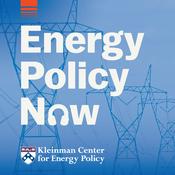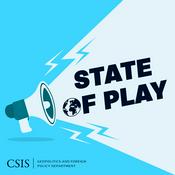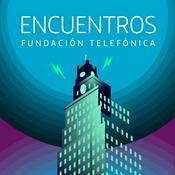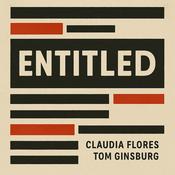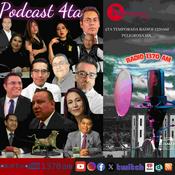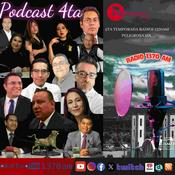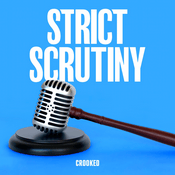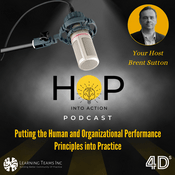465 episodios
- Trump v. Cook
Justia · Docket · oyez.org
Argued on Jan 21, 2026.
Petitioner: Donald J. Trump, President of the United States, et al.
Respondent: Lisa D. Cook, Member of the Board of Governors of the Federal Reserve System.
Advocates: D. John Sauer (for the Applicants)
Paul D. Clement (for the Respondent)
Facts of the case (from oyez.org)
None
Question
None [23-1209] M & K Employee Solutions, LLC v. Trustees of the IAM National Pension Fund
20/1/2026 | 57 minM & K Employee Solutions, LLC v. Trustees of the IAM National Pension Fund
Justia · Docket · oyez.org
Argued on Jan 20, 2026.
Petitioner: M & K Employee Solutions, LLC.
Respondent: Trustees of the IAM National Pension Fund.
Advocates: Michael E. Kenneally, Jr. (for the Petitioners)
John E. Roberts (for the Respondent)
Kevin J. Barber (for the United States, as amicus curiae, supporting the Respondent)
Facts of the case (from oyez.org)
M&K Employee Solutions operated three facilities that participated in the IAM National Pension Fund, a retirement plan jointly funded by multiple employers whose workers were represented by the International Association of Machinists union. In late 2017, the Fund’s actuary valued the plan’s unfunded obligations at about $448 million. Shortly after, in January 2018, the actuary met with the Fund’s trustees and decided to change key financial assumptions used to calculate how much departing employers owed the Fund. Most importantly, they lowered the assumed investment return rate from 7.5% to 6.5%, a change that would significantly increase the bills for employers leaving the plan.
M&K had already begun pulling out of the Fund when two of its facilities stopped participating in 2017. When M&K completely withdrew in 2018, the Fund calculated what M&K owed based on financial data from December 31, 2017, but used the new assumptions adopted in January 2018. This resulted in a withdrawal liability bill of over $6 million. Ohio Magnetics, another company in the Fund, faced a similar situation when it withdrew in mid-2018 and received a bill for about $447,000 calculated the same way.
Both companies challenged their bills through arbitration and won, with arbitrators ruling the Fund could not use assumptions created after the December 31, 2017 measurement date. The Fund then sued in the U.S. District Court for the District of Columbia to overturn these arbitration decisions. The district court sided with the Fund, ruling that actuaries could adopt new assumptions after the measurement date as long as they were based on information available at that time. The court remanded the cases to the arbitrators for reconsideration. Both employers appealed to the U.S. Court of Appeals for the D.C. Circuit.
Question
When a pension plan calculates how much a departing employer owes “as of the end of the plan year,” must the plan use the financial assumptions it had already adopted by that date, or can it use new assumptions created after that date if they are based on information that was available at year-end?- Wolford v. Lopez
Justia · Docket · oyez.org
Argued on Jan 20, 2026.
Petitioner: Jason Wolford.
Respondent: Anne E. Lopez, Attorney General of Hawaii.
Advocates: Alan A. Beck (for the Petitioners)
Sarah M. Harris (for the United States, as amicus curiae, supporting the Petitioners)
Neal Kumar Katyal (for the Respondent)
Facts of the case (from oyez.org)
In 2023, Hawaii and California enacted new laws, Act 52 and Senate Bill 2, respectively, that significantly restrict the public carry of firearms. Both laws prohibit individuals with carry permits from bringing firearms into numerous specified “sensitive places.” Hawaii’s list includes fifteen categories, such as bars, restaurants serving alcohol, parks, beaches, and banks. California’s list is broader, covering more than two dozen types of property, including hospitals, public transit, playgrounds, libraries, museums, places of worship, and casinos.
Both states also changed the default rule for private property open to the public, generally banning firearms unless the property owner expressly permits them. Hawaii allows owners to consent verbally, in writing, or via a posted sign. California’s rule is stricter, permitting consent only through the posting of a specific, state-mandated sign. Plaintiffs in both states include individuals who hold concealed-carry permits and various gun-rights organizations. They filed lawsuits alleging that these new restrictions violate their Second Amendment right to keep and bear arms.
Plaintiffs in both actions sued their respective state attorneys general, and federal district courts issued preliminary injunctions blocking enforcement of many of the new provisions. On appeal, the U.S. Court of Appeals for the Ninth Circuit consolidated the cases, affirming the injunctions in part but reversing them in large part. The Ninth Circuit’s ruling allowed many of the challenged restrictions to remain in effect but agreed with the district courts that the states could not, for example, ban firearms in banks or hospitals.
Question
Does a law that makes it a crime for a licensed concealed carry permit holder to bring a handgun onto private property open to the public—such as a store or restaurant—unless the property owner gives “express authorization” violate the Second Amendment? - Galette v. New Jersey Transit Corp.
Justia · Docket · oyez.org
Argued on Jan 14, 2026.
Petitioner: Cedric Galette.
Respondent: New Jersey Transit Corporation.
Advocates: Michael Zuckerman (for New Jersey Transit Corp., et al. (Respondent in No. 24-1021, Petitioners in No. 24-1113))
Michael B. Kimberly (for Galette and Colt, et al. (Petitioner in 24-1021, Respondents in 24-1113))
Facts of the case (from oyez.org)
In August 2018, Cedric Galette was a passenger in a vehicle stopped on Market Street in Philadelphia when it was struck by a vehicle operated by the New Jersey Transit Corporation (NJ Transit). Galette suffered physical injuries as a result of the collision and brought a negligence lawsuit in Pennsylvania state court against both the vehicle’s driver, Julie McCrey, and NJ Transit. NJ Transit responded by asserting that it was an arm of the State of New Jersey, and therefore immune from private suit in Pennsylvania under the doctrine of interstate sovereign immunity.
The trial court denied NJ Transit’s motion to dismiss, and the Pennsylvania Superior Court affirmed, holding that NJ Transit is not an arm of New Jersey. The Supreme Court of Pennsylvania reversed, holding that NJ Transit qualifies as an arm of the state and is therefore immune under the doctrine of interstate sovereign immunity.
Question
Is the New Jersey Transit Corporation an arm of the State of New Jersey for interstate sovereign immunity purposes? - West Virginia v. B.P.J.
Justia · Docket · oyez.org
Argued on Jan 13, 2026.
Petitioner: West Virginia, et al.
Respondent: B. P. J., By Her Next Friend and Mother, Heather Jackson.
Advocates: Michael R. Williams (for the Petitioners)
Hashim M. Mooppan (for the United States, as amicus curiae, supporting the Petitioners)
Joshua A. Block (for the Respondent)
Facts of the case (from oyez.org)
B.P.J. is a transgender girl who has identified as female since the third grade. At the onset of puberty, B.P.J. began taking puberty blockers and estrogen for medical treatment of gender dysphoria, effectively halting male pubertal development and aligning her physical characteristics with those of cisgender girls. Since her social transition, B.P.J. has consistently lived as a girl at school and participated on girls’ athletic teams. In 2021, West Virginia enacted the “Save Women’s Sports Act,” which requires public school and collegiate sports teams to be designated based on “biological sex” and excludes individuals identified as male at birth from participating on female teams. This law, by its design and effect, prevented B.P.J. from continuing to compete on her school’s girls’ cross-country and track teams.
Shortly after the Act took effect, B.P.J., through her mother, sued the West Virginia State Board of Education and other state and county education officials, as well as the West Virginia Secondary School Activities Commission. She alleged that excluding her from girls’ sports violated the Equal Protection Clause and Title IX. The State of West Virginia intervened to defend the law. Initially, the district court granted B.P.J. a preliminary injunction, allowing her to participate on girls’ teams pending litigation. However, at summary judgment, the district court reversed course and upheld the law, concluding that the classification on the basis of “biological sex” was substantially related to the important government interest in ensuring fairness and opportunity in girls’ athletics. The court granted summary judgment to the defendants and denied B.P.J.’s cross-motion, holding that the exclusion of B.P.J. from girls’ sports did not violate the Constitution or Title IX. On appeal, the U.S. Court of Appeals for the Fourth Circuit reversed in part, vacated in part, and remanded. It held that application of the law to B.P.J. violated Title IX and that factual disputes precluded summary judgment against her equal protection claim.
Question
Does Title IX or the Equal Protection Clause prohibit a state from assigning students to girls’ and boys’ sports teams based on their biological sex as determined at birth?
Más podcasts de Gobierno
Podcasts a la moda de Gobierno
Acerca de Supreme Court Oral Arguments
A podcast feed of the audio recordings of the oral arguments at the U.S. Supreme Court.
* Podcast adds new arguments automatically and immediately after they become available on supremecourt.gov
* Detailed episode descriptions with facts about the case from oyez.org and links to docket and other information.
* Convenient chapters to skip to any exchange between a justice and an advocate (available as soon as oyez.org publishes the transcript).
Also available in video form at https://www.youtube.com/@SCOTUSOralArgument
Sitio web del podcastEscucha Supreme Court Oral Arguments, The Interview y muchos más podcasts de todo el mundo con la aplicación de radio.net
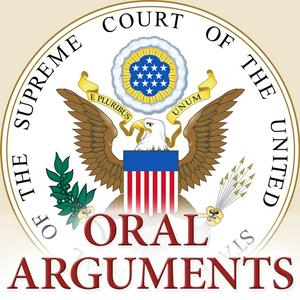
Descarga la app gratuita: radio.net
- Añadir radios y podcasts a favoritos
- Transmisión por Wi-Fi y Bluetooth
- Carplay & Android Auto compatible
- Muchas otras funciones de la app
Descarga la app gratuita: radio.net
- Añadir radios y podcasts a favoritos
- Transmisión por Wi-Fi y Bluetooth
- Carplay & Android Auto compatible
- Muchas otras funciones de la app


Supreme Court Oral Arguments
Escanea el código,
Descarga la app,
Escucha.
Descarga la app,
Escucha.






